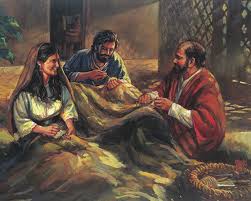Romans 16 – Last Week
It used to be that when you went to the movies, once the credits started rolling, people would get up and make their way to the exit. Even now, when we watch movies in our home, we often hit the “stop” button as the list of actors and the crew start creeping up the screen. If you’re like me, I don’t really know what a gaffer is so I don’t feel the need to know who the gaffer was on a movie. But at some point, some movies started to throw in extra footage either alongside the credits or after the credits ran. Sometimes it would be bloopers or outtakes, but sometimes it would be a scene that took place in the future to let you know how the story ended. This would be a way to get people to not miss the list of names of people who contributed to the movie; the people who played a role in some way in creating the picture that was just shown. Each person listed would have been important enough to the movie to be recognized. And so, extra scenes or footage would be plugged in at the end as a means of having those people acknowledged.

Paul is wrapping up his letter to the Romans and before he gives the doxology at the end, Paul mentions twenty-six people by name and references two people whom he doesn’t call by name. This is somewhat like the credits of a movie, right? He makes mention of contributors to his life. If you’re like me, when I see a list of names in Scripture, I will often skim down to where the list ends and pick up reading from there. But in 2 Timothy 3:16 BSB we are told that “All Scripture is God-breathed and is useful for instruction, for conviction, for correction, and for training in righteousness” and for that reason, I don’t want us to disregard those people Paul felt compelled to mention.
Romans 16: 1 NKJV “I commend to you Phoebe our sister, who is a servant of the church in Cenchrea, 2 that you may receive her in the Lord in a manner worthy of the saints, and assist her in whatever business she has need of you; for indeed she has been a helper of many and of myself also.”
This scripture implies that Phoebe is the one who delivered the letter to the Romans. We’ve been studying the book of Romans for 5 months now and I think we lose sight that what we’ve studied was actually a handwritten letter from one man to a group of believers. When the letter was delivered, can you just picture the word getting out that Paul had sent them something to read? Can you envision the people gathering together, grabbing a cup of coffee, and settling down in a comfortable spot to hear what Paul had to say? I can imagine them nestled around, intently listening to the words, nodding in agreement at what he had to say at times, and feeling convicted at other times.
He starts the letter off by introducing them to Phoebe. He calls her “our sister”, meaning that she is a follower of Christ. I have a sister who is a biological sister. We share the same parents. My sister and I also have a friend that we’ve known since birth that we refer to as our sister. We obviously don’t have the same parents, but when I think of sisters, I still consider her along with my biological sister. We’ve shared a lot of experiences in life and there’s a bond between the three of us that is best described as a “family”. When something goes in the life of one of us, the other two feel it as well. Whether it’s heartache, concern, or celebration, we share in it together. That’s what family is.
That’s what the body of Christ is supposed to be like. We are all adopted into the family of God, thereby making us related to one another. We are meant to share experiences with one another and to have an intertwined bond. In Biblical times, it seems that this was a lot more prevalent than it is today. I’m not sure that we necessarily see ourselves as a family as deeply as God intended. We may occasionally refer to others as our sisters or brothers in Christ, but do we treat them as such? Do we feel that closeness, that kinship with one another the way God intended?



Paul states that Phoebe is a servant of the church. Other translations use the word “deacon” or “deaconess”. We have men serving as deacons in our church as defined in 1 Timothy. The reference to Phoebe as being a “deacon” has raised some eyebrows simply because we don’t have female deacons. But the Greek word used in this text was diakonos (dee-ak’-on-os) which literally means “servant”. And women were used in those days to visit the sick, care for those less fortunate as well as train younger women. In other words, Phoebe was a follower of Christ who used her days to serve the Lord by helping others.
The trip that Phoebe took to reach the city of Rome was between 700 and 800 miles. The trip would have been anywhere from 5 days to 4 weeks long depending on her route, her mode of transportation as well as what time of the year it was. Most likely, she would have covered all of the expenses involved herself. Paul stated that she had been a great helper to him and many others and several commentaries suggest that she was a generous donator, not only of her time but also of resources. Paul instructs them to “receive her in a manner worthy of the saints”. Quite complimentary, isn’t it? You can tell by the way Paul refers to her and the expectations he has of the treatment she is to receive, that Phoebe is respected and valued by Paul and others.
He then mentions Priscilla and Aquila. Romans 16:3 NKJV “Greet Priscilla and Aquila, my fellow workers in Christ Jesus, 4 who risked their own necks for my life, to whom not only I give thanks, but also all the churches of the Gentiles. 5 Likewise greet the church that is in their house.”

They were a married couple that Paul had met in Corinth. They, just like Paul, were tentmakers. That was their trade. They invited Paul to stay with them and work with them and as time went on, they joined his ministry. In Acts 18:18 NIV “Paul stayed on in Corinth for some time. Then he left the brothers and sisters and sailed for Syria, accompanied by Priscilla and Aquila. 19 They arrived at Ephesus, where Paul left Priscilla and Aquila.”
We know from chapter 16 of Romans, that the couple has made their way to Rome and in verse 5, we are told that they host a church in their home. Priscilla and Aquila were church planters and as such, were very dear to Paul.
Paul mentions others. Romans 16:5b NKJV “Greet my beloved Epaenetus, who is the firstfruits of Achaia to Christ. 6 Greet Mary, who labored much for us. 7 Greet Andronicus and Junia, my countrymen and my fellow prisoners, who are of note among the apostles, who also were in Christ before me.”
Four people were specifically mentioned in those verses. One is referred to as “my beloved”. One labored much. The other two were fellow prisoners with Paul but he also states that they were “of note among the apostles”. Other translations read “they were well known among the apostles”, “outstanding to the apostles”, “highly respected”.
Romans 16:8 NKJV “Greet Amplias, my beloved in the Lord. 9 Greet Urbanus, our fellow worker in Christ, and Stachys, my beloved. 10 Greet Apelles, approved in Christ. Greet those who are of the household of Aristobulus. 11 Greet Herodion, my countryman. Greet those who are of the household of Narcissus who are in the Lord.”
In these three verses, two are also referred to as “my beloved”. Urbanus is called a fellow worker in Christ. Apelles, he notes, is “approved in Christ”. We aren’t given the reason for this description, but it’s clear there’s a story there and Apelles most likely was tested and found to be faithful. He refers to Herodion as his countryman which means they are of the same tribe, race, or possibly actually blood-related. Two households are named. One is the entire household of Aristobulus. The other household mentioned, Paul says to greet only those who are in the Lord which indicates that not all within the house were followers of Jesus.
Romans 16:12 NKJV “Greet Tryphena and Tryphosa, who have labored in the Lord. Greet the beloved Persis, who labored much in the Lord.”
Tryphena and Tryphosa were sisters, possibly twins. Paul describes them as “laboring in the Lord”. He speaks of Persis and refers to her as “the beloved”. You may have noticed the others mentioned before Paul called them “my beloved”. They were all men. Persis is female and therefore, it would have been improper for him to refer to a woman as “my beloved” as that would have indicated a romantic relationship. Instead, he calls her “the beloved” meaning she was loved by many and he comments that she not only labored in the Lord, but Paul also says that she labored much.
Romans 16: 13 NKJV “Greet Rufus, chosen in the Lord, and his mother and mine.”

14 Stations of the Cross (5) Simon of Cyrene Helps Jesus Carry the Cross
This one is interesting because it’s believed that this is the same Rufus referred to in Mark 15:20 NIV “And when they had mocked him, they took off the purple robe and put his own clothes on him. Then they led him out to crucify him.21 A certain man from Cyrene, Simon, the father of Alexander and Rufus, was passing by on his way in from the country, and they forced him to carry the cross. 22 They brought Jesus to the place called Golgotha (which means “the place of the skull”).”
So the Rufus that Paul is referring to would have had at least a secondhand close connection to Jesus. Can you just imagine the closeness his father would have felt to Jesus right before the crucifixion took place? Can you imagine the personal depth of appreciation that Rufus and his family would have felt towards the sacrifice of Jesus? And did you notice that Paul also asks the Romans to greet the mother of Rufus and he refers to her as “his mother and mine”? This is quite sweet in that it indicates a close, brotherly relationship between Paul and Rufus so much so that Rufus’ mother is considered a mom to Paul as well.
Romans 16:14 NKJV “Greet Asyncritus, Phlegon, Hermas, Patrobas, Hermes, and the brethren who are with them. 15 Greet Philologus and Julia, Nereus and his sister, and Olympas, and all the saints who are with them.”

There is a little portion of that last verse that makes me giggle. Did you notice that he names nine different people, and refers to “the brethren” and “all the saints”, but he doesn’t give the name of Nereus’ sister? He simply says “Nereus and his sister”. It makes me wonder if Paul just couldn’t remember her name, but didn’t want to exclude her from those he was mentioning.
Paul built relationships with these people. He cared for them; he loved them. They served together. He recognized their service, their dedication, their contributions. These people made an impact on his life as much as he did theirs. He surrounded himself with Godly people and invested in a relationship with each of them. Do we have that kind of relationship with others? Are we intentional about caring for others, serving and working much, or laboring to the point that others take notice? I can guarantee you that none of these people mentioned did what they did for the recognition. They did it because of their love for God and their love for others. They served the Lord because it was an honor for them to do so. Their service, their labor, as well as their relationships were genuine. Are we that passionate so that others take notice? Not because we want to be noticed, but rather because God’s light shines so brightly those around us can’t help but take note.
Who is your beloved?
Are you someone’s beloved?
In thinking of those that you worship amongst and serve alongside, who would you mention as your beloved? Who has labored much? Who has helped many? Who has put their necks on the line for others? And the bigger question is, are you living in such a way that your name would have been included in any of those categories?
If someone were to ask me tonight what I did today, I would start off by saying, “I went to church.” That would be correct, in a sense. We picture going to church as a building with a steeple, a cross, possibly stained glass windows, pews, an altar. We gather, at most, once or twice a week and then go about our individual lives. Jack Wilkie says this: “That’s just not the picture the New Testament paints, and it robs us of the strength God has given us for our personal walks, for helping each other, and for making an impact on the world to His glory. If we say that church is something we are rather than something we attend, then it’s necessary to mold our lives after what Jesus wants His church to be. We cannot buy in to the popular but misguided idea that we can be Christians without being deeply involved in each other’s lives.”[i]
So we much ask ourselves: Do I go to church or AM I the church?
Remember the song that many of us sang in the children’s choir?
I am the church! You are the church!

We are the church together!
All who follow Jesus,
all around the world!
Yes, we’re the church together!
The church is not a building;
the church is not a steeple;
the church is not a resting place;
the church is a people.[ii]
As we get to the end of the chapter, there are a few more names that Paul feels compelled to include. These would have been the people that he was surrounded by at that time. Others that were contributing to the ministry.
Romans 16: 21-24 (PHILLIPS) “Timothy, who works with me, sends his greetings, and so do Lucius and Jason and Sosipater my fellow countrymen. (Paul has just told me that I, Tertius, who have been taking down this epistle from his dictation, may send you my Christian greetings too.) Gaius, my host (and the host as a matter of fact of the whole church here), sends you his greetings. Erastus, our town clerk, and Quartus, another Christian brother, send greetings too.”
And then the final closing. It’s believed that Paul would have taken the pen from Tertius and written the last bit himself and he does so in the form of a doxology. He’s beautifully summing up the major points of the letter to the Romans while praising God.
Romans 16:25-27 ERV “25 Praise God! He is the one who can make you strong in faith. He can use the Good News that I teach to make you strong. It is the message about Jesus Christ that I tell people. That message is the secret truth that was hidden for ages and ages but has been made known. 26 It has now been shown to us. It was made known by what the prophets wrote, as God commanded. And it has now been made known to all people so that they can believe and obey God, who lives forever. 27 Glory forever to the only wise God through Jesus Christ. Amen.”
Those words that Paul wrote were meaningful to him and most likely just as meaningful to those listening. He has summed up his purpose for writing the letter and, in doing so, he has acknowledged those that have been instrumental in the ministry that he was so passionate about. Were these the only people Paul had encountered? Certainly not! But these individuals Paul felt particularly compelled to mention would have been those who made an impact for the glory of God. These would have been those who did something, participated, served, and worked…all for the glory of God.
Looking at your own life, are you doing enough to get noticed by those who matter?
[i] https://www.focuspress.org/2018/09/13/we-dont-go-to-church-we-are-the-church-or-are-we/#:~:text=%E2%80%9CWe%20don%E2%80%99t%20go%20to%20church%E2%80%A6%20we%20are%20the,the%20church%20is%20God%E2%80%99s%20gathering%20of%20His%20people.
[ii] https://www.hopepublishing.com/find-hymns-hw/hw4145.aspx#:~:text=Refrain%3A%20I%20am%20the%20church%21%20You%20are%20the,a%20resting%20place%2C%20the%20church%20is%20a%20people.